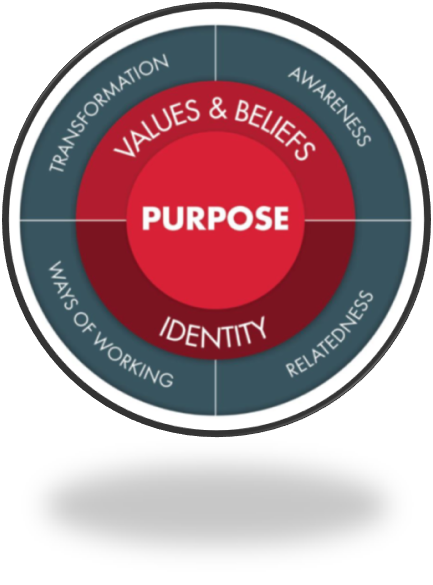
Leadership Team Coaching
Leadership Team Coaching for Senior Teams
Unlock the collective brilliance of your team in a complex world – without burning people out
60+ Nationalities Coached in 100+ Organisations | MSc Coaching & Behaviour Change (Henley) | Hogan Certified | Former Fortune 100 Transformation, Innovation, Leadership Development
Accredited. Evidence-led. Confidential by design.
Leadership Team Coaching is for you if…
You’ll recognise your leadership team in one or more of these patterns:
1. Change, transition & reset moments
A new CEO or senior leader has joined and the team needs to reset how it works together.
The leadership team has been reshaped after a restructure, merger or acquisition.
A major transformation requires alignment across different leadership cultures.
Senior leaders operate in a complex matrix or global system and need to lead as one team, not a collection of roles.
2. Trust, conflict & power dynamics
Trust has eroded between key members of the leadership team.
Conflict is driven by competing priorities, personalities or unspoken tensions.
Cliques or sub-groups are forming, creating division and “us vs them” dynamics.
Historic tensions or unresolved issues are quietly undermining respect and collaboration.
3. Decision-making & execution gaps
Meetings are polite, but real views are held back - the meeting after the meeting is where decisions happen.
Decisions don’t stick, leading to slow execution and mixed messages across the organisation.
Some voices dominate while others withdraw, breeding resentment or disengagement.
Accountability is diffused — everyone is busy, but few feel collectively responsible for outcomes.
4. Culture, diversity & pressure
Leaders struggle to work effectively across national, functional or legacy cultures.
Under sustained pressure (crises, growth, transformation), relationships become strained and transactional.
Low empathy, poor listening or avoidance is damaging day-to-day trust.
There’s misalignment between stated values and the behaviours actually modelled at the top.
If two or more of these feel uncomfortably familiar, your team is operating with a handbrake on - and it won’t fix itself.
If any of those patterns are showing up, the issue isn’t effort or capability - it’s the team’s underlying operating system.
What’s really driving the team’s performance (the iceberg beneath the surface)
Most leadership teams try to fix the visible symptoms: meeting overload, slow decisions, conflict, silos. But those symptoms are produced by deeper forces.
Goals, roles and meetings are visible. But performance is often decided by what sits below the waterline - defences, unspoken fears, status threats and systemic pressures.
Team coaching works when we shift what’s under the waterline, so behaviour changes sustainably.
This is why our process includes interviews, stakeholder input and observation in real meetings - because the truth isn’t in what teams say, it’s in what teams repeatedly do.
How Leadership Team Coaching Works: Contract → Discovery → Shift → Embed
Leadership Team Development Coaching Programmes
All programmes follow the same four phases - Contract → Discovery→ Shift → Embed - scaled to your timeframe and the depth of systemic change required. All our programs are co-developed with our clients unique situations. However many clients find it useful to understand how programs can be structured at a high level:
How do you know which one to select?
Choose Short Reset if the leadership team is generally on track but needs some work.
Choose Performance Accelerator if execution is being slowed by repeated patterns.
Choose Full Systemic if the team keeps replaying the same dysfunction across quarters or leadership changes and/or the team stakes are significant.
-
Best for: a capable team that’s stuck in misalignment, rising tension, or delivery drag - and needs a fast reset before momentum is lost.
This may include:
Sponsor contracting: success criteria, boundaries, and what “better” will look like in observable terms
Team + key stakeholder interviews to surface the real friction points (not just symptoms)
One full-day working session to work on the themes raise in interviews
Follow-up check-in to lock commitments and prevent regression
This is designed to stabilise and align. Deep behavioural change typically requires longer.
-
Best for: leadership teams that need to lift execution and collaboration - especially during transformation, scale, or reorg complexity.
This may include:
Everything in the Short Reset, plus:
A series of workshops/working sessions focused on the highest-leverage levers
Targeted 1:1 leader coaching sessions to shift individual patterns that keep reappearing in the team system
Midpoint review: re-diagnose what’s improved, what’s stuck, and what must change next
Measurement: baseline + midpoint + end pulse on agreed behavioural and outcomes
-
Best for: high-stakes leadership teams with entrenched dynamics, major stakeholder complexity, or repeated patterns across cycles (new strategy, same dysfunction).
What we do
Everything in the Performance Accelerator, plus:
Observation in real meetings (where the truth lives), with live coaching interventions
Ongoing support to embed new norms into decision forums, governance, and operating rhythm
Stakeholder integration: aligning expectations, reducing cross-boundary friction
Deeper work on team “understructure”: power dynamics, conflict, defensive routines, unspoken contracts
Sustainment plan: self-coaching practices so the team doesn’t become dependent on the coach
For in-depth program details, or customised options…
Team Coaching Client Feedback…
“As our team coach … Edwin engaged and put programs together to reconnect the team in this new virtual world not only did this give a sense of belonging but also reenergised the team to develop, deliver and grow individually and as team members. I can say today we are a stronger team based on Edwin’s coaching program and development.”.
Clif T. EMEA Commercial Project Manager, (South Africa).
When Leadership Team Coaching Becomes Business Critical…
and when it creates the most value for you...
These are the patterns that signal a leadership team is under strain. If you recognise several, performance won’t “self-correct” without an intentional reset.
| Severity | Pattern | What You’ll Observe | Typical Situation | Risk if Ignored |
|---|---|---|---|---|
| SEVERE | Leadership team change or power shift | Competing narratives; role confusion; visible unease; trust tested early | New CEO/SLT; merger; transformation; turnaround | Execution stall; culture drift; critical talent loss |
| SEVERE | Decision paralysis & lack of collective commitment | Endless debate; reversals; “agree in the room, diverge outside”; weak ownership | Strategic ambiguity; competing executive agendas; high stakes decisions | Missed windows; slow execution; leadership fatigue |
| SEVERE | Inattention to shared results | Silo wins over enterprise outcomes; KPI fragmentation; “not my problem” behaviour | Complex matrix; unclear success measures; growth plateau | Value erosion; internal competition; poor execution |
| HIGH | Low psychological safety & conflict avoidance | Polite meetings; real issues unsaid; back-channel debate; rising “meeting after the meeting” | Cultural caution; recent downsizing; senior turnover | Poor decision quality; undiscussed risk; slow learning |
| HIGH | Erosion of trust & leadership fragmentation (us vs them) | Micro-alliances; guarded comms; mixed messages; side-meetings replace real alignment | Failed change history; post-merger integration; rapid scaling | Politics; stakeholder confusion; talent drain |
| HIGH | Avoidance of accountability (peer-to-peer) | Slipped commitments; weak follow-up; leader becomes the enforcer; accountability “rolls uphill” | Remote/hybrid leadership; unclear metrics; overloaded agendas | Performance decay; normalised mediocrity |
| HIGH | Top team stuck in storming / norming (not reaching performing) | Guarded behaviour; recurring tensions; norms unclear; the same debates loop | Newly formed SLT; CEO transition; integration | Decision churn; fragile execution; slow cadence |
| HIGH | Change fatigue and cynicism | Eye-rolls at initiatives; passive resistance; “this will pass”; falling follow-through | Overlapping programmes; rolling reorganisations; constant priorities shift | Engagement drop; stalled transformation; credibility loss |
| HIGH | Burnout in the senior team (firefighting becomes the norm) | Reactive leadership; decision shortcuts; reduced patience/empathy; spikes in absence | Sustained pressure; under-resourcing; unclear priorities | Governance gaps; turnover risk; loss of resilience & creativity |
If two or more patterns feel uncomfortably familiar, your team is running with a handbrake on and it won’t fix itself.
“Only 13% of teams continuously accelerate - the rest stagnate or plateau.” Price and Toye, 2017
We help you join that 13%
© Performance Edge 2015
One of our most popular approaches: ‘Creating the Team Edge’ developing High-Performing Teams
We often use the Creating the Team Edge framework: a practical, evidence-based way to align purpose, ways-of-working and behaviours so your team performs under pressure (see graphic),
To excel in creating high performing teams, a fundamental step is understanding the team's specific circumstances and evaluating their progress. To facilitate this, we offer a Team 360 diagnostic tool, a team cultural audit, as part of our team coaching process.
This diagnostic tool involves interviews and a Team 360 Questionnaire, which can survey up to 100 individuals, including team members, direct reports, team sponsors, and stakeholders, regarding how closely the team aligns with our proven model.
We use the resulting Team 360 report in our team coaching approach significantly helping to surface unspoken team perspectives and group dynamics in a relational style.
This is a key benefit of Team Coaching compared to other team development approaches such as training or facilitation.
This isn’t sports-style coaching or pep talks. We work on the team’s operating system - decision-making, conflict norms, accountability and stakeholder alignment, so performance holds under pressure.
How does Team Coaching Compare To Other Team Development Approaches?
Understanding the difference between team coaching, facilitation, and training helps leaders choose the right intervention. Facilitation manages dialogue and coordination, while training builds specific skills. In contrast, team coaching develops how the team thinks, relates, and performs together over time - strengthening its collective capacity to lead and deliver results.
| Aspect | Team Building | Team Training | Team Consulting | Team Mentoring | Team Facilitation | Team Coaching |
|---|---|---|---|---|---|---|
| Time Frame | Short, 1–5 days | Short, 1–5 days | Widely variable | Staccato, hours over time | Short, 1–5 days | Longer term, months |
| Process | Exercises | Work through a structured curriculum | Consultant shares expertise | Mentor shares experience | Facilitated dialogue | Coach partners with team to co-create insight |
| Growth Area | Enhanced relationships | New knowledge or skill | Additional insights | New knowledge | Clarity | Achieved goals; team sustainability |
| Team Dynamics & Conflict Resolution | Minimal | Minimal | Advisory only | Minimal | Minimal | Integral |
| Expert Ownership | Instructor | Trainer | Consultant | Mentor | Facilitator and team | Team own outcomes |
Team coaching builds a leadership team’s capacity to self-observe, adapt, and sustain performance. Coaches may use elements of facilitation, consulting, or training when helpful, but ownership and learning return to the team.
Sectors we develop high performing teams within include…
Your leadership team is made up of high-performers. But that doesn’t always mean high-functioning.
Competing agendas, subtle power dynamics, and unspoken tensions can limit what’s possible - even when everyone has the same goals.
High Performing Leadership Team Programs
-
Bespoke High Performing Leadership Team
High-performing leadership team coaching programmes are designed to enhance collaboration, communication, and strategic thinking within teams.
These programmes focus on aligning individual strengths with team objectives, fostering a culture of accountability and trust. Through tailored coaching sessions, leaders are encouraged to challenge their assumptions, embrace diverse perspectives, and develop innovative solutions to complex problems,
These programmes not only elevate team performance but also cultivate a resilient leadership pipeline capable of navigating the challenges of an ever-evolving business landscape. Ultimately, the goal is to empower leaders to inspire their teams, driving sustained organisational success.

-
The Innovators Team Dilemma
Innovators are the heartbeat of successful enterprises. Often appreciated, regularly under-appreciated.
The team coaching programme for innovators is designed to foster creativity, collaboration, influence and resilience within teams that drive change and explore new ideas. Through a series of dynamic sessions, participants engage in tailored exercises that promote open communication and constructive feedback, enabling them to harness diverse perspectives and challenge conventional thinking.
By cultivating a culture of trust and psychological safety, this programme empowers innovators to unleash their full potential and transform visionary concepts into actionable strategies that deliver impactful results.
This program helps innovation teams in their evolution to the next stage of performance.

-
Founders Transition
Over time, leadership teams, and in particular, founders often move onwards to pursue bigger and better things in their careers and personal lives. This might include taking more time for leisure activities like playing golf or even transitioning from a CEO role to a more advisory position as a Chairman.
Our programme is specifically designed to successfully support these critical transitions that leaders face. This comprehensive support includes our innovative Team 360 approach, combined with additional systemic team coaching methodologies that enhance effectiveness and collaboration within the team.
This program supports critical leadership transitions within teams

Imagine a team where decisions move faster, trust runs deeper, and alignment isn’t a constant struggle.
Team Development Coaching with Edwin - ICF PCC, MSc Coaching and Behaviour Change
Hi, I’m Edwin, a Professional Certified Coach (ICF) with an MSc in Coaching & Behaviour Change, and decades of business experience in one of the worlds most innovative Fortune 100 global conglomerates.
I’ve partnered with senior leaders and top talent like you across more than 60 nationalities. I am excited to offer bespoke professional coaching for you and your organisations.
Want to surface what’s really holding your team back?
Start with a confidential conversation.
FAQ | Team Coaching | Leadership Team Development
-
Leadership team development through Systemic team coaching develops the team’s collective leadership in relation to its stakeholders and the wider organisation. It focuses on how the team works together and the value it creates beyond itself, not just on individual skills or away-day bonding. It blends observation, facilitation and coaching to improve performance and relationships.
-
Whilst a skilled team coach may use different modalities such as facilitations skills in a workshop there are distinct differences in approach…
Team coaching builds the capability of the leadership team itself over time.
Facilitation helps a group run a specific meeting or workshop effectively.
Training transfers knowledge/skills to individuals or a group. (See our table above comparing approaches).
Team coaching is an ongoing process that improves how the team thinks, relates and performs over time. It integrates diagnostics, live observation and targeted workshops so improvements stick when pressure rises, not just during off-sites.
-
Team coaching works with an intact, interdependent team to improve collective performance toward shared goals, while group coaching brings individuals (often unrelated) together to pursue personal goals and peer learning without shared accountability
-
A team coach partners with the whole team to clarify purpose and agreements, foster psychological safety and learning, surface system dynamics, and build collective accountability so the team sustainably improves performance and stakeholder value.
This is a skilled role requiring in depth psychology training at an individual and team level, ideally together with business knowledge.
-
We use 1:1 interviews and potentially a couple of different Team 360 diagnostics (including Creating the Team Edge) and occasionally Hogan assessments to surface how stakeholders experience the team: strengths, gaps and patterns that people often feel but don’t name. The insight guides a bespoke programme so we work on the few things that change everything.
-
Most engagements run 3–9 months: discovery and diagnostics (weeks 1–4), focused workshops and coaching (weeks 5–20), then review and handover. Cadence and scope depend on goals, size and context (e.g., new leader, re-organisation, M&A).
-
Common outcomes include clearer priorities, faster decisions, healthier conflict, better stakeholder alignment and improved cross-functional collaboration.
-
Yes. We blend on-site and virtual sessions, use tools that work across time zones and focus on practices that build connection and momentum between meetings.
-
Begin with a short call to clarify goals and context. We’ll propose a diagnostics plan and draft programme with milestones and success measures. If it feels like a fit, we schedule interviews and 360s to start the work.


















